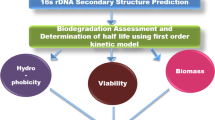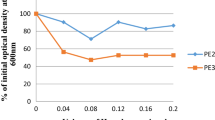Abstract
One of the most serious man-made concerns today is the ever-increasing amount of plastic waste overwhelming the planet. The worldwide interest in using polymers consistently expanded over the years. Because of the plastic wastes thrown into the environment, outrageously the plastic pollution is increasing. In the present study, degradation of PVC and polyethylene-derived synthetic polymers has been carried out. The fungi and bacteria were isolated from the soil of the plastic waste environment and were used for the biodegradation of plastic films. Successful bacterial candidates for biodegradation were identified after screening. The bacterial strain Sb1 was identified as Bacillus licheniformis and Sb2 as Achromobacter xylosoxidans. The fungal strains Sf.1 and Sf.2 were identified as Aspergillus niger and Aspergillus glaucus, respectively. The degraded polymeric films were critically assessed by following the characterization methods like weight loss, FTIR and SEM. The results indicate that the polymers of polyethylene sample showed 32.2% degradation using bacterial strains and 40% using fungal strains in a time duration of just 4 weeks. PVC samples degraded 17 and 32% by fungal strains after 4 weeks. The changes in surface topography was confirmed by scanning electron microscopy and the changes in functional groups intensity was observed using the FTIR. Different parameters, varying temperature, pH, and inoculum concentration, were also evaluated, which implied that plastic waste treated by fungal and bacterial strains gives significant (p < 0.05) result in polymer degradation. As a result, the current research gave a scientific justification that bacteria and fungus could be further developed as promising candidates for plastic bioremediation.


source in lab. B Degradation potential of fungal and bacterial isolates in Soil burial test in terms of weight loss percentage. The results shown are the average of three independent experiments. Error bars indicate standard deviation (± SD). *p < 0.05








Similar content being viewed by others
References
Ali MI, Ahmed S, Robson G, Javed I, Al N, Atiq N, Hameed A (2014) Isolation and molecular characterization of polyvinyl chloride (PVC) plastic degrading fungal isolates. J Basic Microbiol 54(1):18–27. https://doi.org/10.1002/jobm.201200496
Alvarez-Barragan J et al (2016) The biodegradative activity of selected environmental fungi on a polyester polyurethane varnish and polyether polyurethane foams. Appl Environ Microbiol 82:5225–5235. https://doi.org/10.1128/AEM.01344-16
Anwar MS, Kapri A, Chaudhry V, Mishra A, Ansari MW, Souche Y, Goel R (2016) Response of indigenously developed bacterial consortia in progressive degradation of polyvinyl chloride. Protoplasma 253(4):1023–1032. https://doi.org/10.1007/s00709-015-0855-9
Awasthi S, Srivastava N, Singh T, Tiwary D, Mishra PK (2017) Biodegradation of thermally treated low-density polyethylene by fungus Rhizopus oryzae NS 5. 3Biotech 7(1):73–80. https://doi.org/10.1007/s13205-017-0699-4
Begum MA, Varalakshmi B, Umamagheswari K (2015) Biodegradation of polythene bag using bacteria isolated from soil. Int J Curr Microbiol Appl Sci 4(11):674–680
Bhatia M, Girdhar A, Tiwari A, Nayarisseri A (2014) Implications of a novel pseudomonas species on low density polyethylene biodegradation: an in vitro to in silico approach. Springerplus 3:497. https://doi.org/10.1186/2193-1801-3-497
Bonhomme S, Cuer A, Delort AM, Lemaire J, Sancelme M, Scott G (2003) Environmental biodegradation of polyethylene. Polym Degrad Stab 81(3):441–452. https://doi.org/10.1016/S0141-3910(03)00129-0
Chaudhary AK, Vijayakumar RP (2019) Studies on biological degradation of polystyrene by pure fungal cultures. Environ Dev Sustain. https://doi.org/10.1007/s10668-019-00394-5
Das MP, Kumar S, Das J (2018) Fungal-mediated deterioration and biodegradation study of low-density polyethylene (LDPE) isolated from municipal dump yard in Chennai, India. Energy Ecol Environ 3(4):229–236. https://doi.org/10.1007/s40974-018-0085-z
El-Sayed MT, Rabie GH, Hamed EA (2021) Biodegradation of low-density polyethylene (LDPE) using the mixed culture of Aspergillus carbonarius and A. fumigates. Environ Dev Sustain. https://doi.org/10.1007/s10668-021-01258-7
European Parliament (2020) plastics—the facts 2020. An analysis of European plastics production, demand, and waste data. Available from: https://www.plasticseurope.org/en/resources/market-data (Accessed 07 March 2021).
Hikmah M, Setyaningsih R, Pangastuti A (2018) The potential of lignolytic trichoderma isolates in LDPE (low-density polyethylene) plastic biodegradation. IOP Conf Ser: Mater Sci Eng 333:012076. https://doi.org/10.1088/1757-899X/333/1/012076
Jain K, Bhunia H, Reddy MS (2021) Degradation of polypropylene-poly-L-lactide blends by bacillus isolates: a microcosm and field evaluation. Bioremediat J. https://doi.org/10.1080/10889868.2021.1886037
Khan S, Nadir S, Shah ZU, Shah AA, Karunarathna SC, Xu J, Khan A, Munir S, Hasan F (2017) Biodegradation of polyester polyurethane by Aspergillus tubingensis. Environ Pollut 225:469–480. https://doi.org/10.1016/j.envpol.2017.03.012
Kumari R, Singh S, Pradhan N, Chandni S, Karthik L, Kumar G, Rao KB (2014) RSM optimized media to increase the antibacterial activity of wild and mutated strain of Nocardiopsis VITSRTB. Res J Pharm Tech 7(2):213–220
Mansoor A (2019) Environment: how plastic is killing US dawn. https://www.dawn.com/news/1477373. Accessed 22 Nov 2019
Muhonja CN, Makonde H, Magoma G, Imbuga M (2018) Biodegradability of polyethylene by bacteria and fungi from Dandora dumpsite Nairobi-Kenya. PLoS ONE 13(7):e0198446. https://doi.org/10.1371/journal.pone.0198446
Nanda S, Sahu S, Abraham J (2010) Studies on the biodegradation of natural and synthetic polyethylene by pseudomonas spp. J Appl Sci Environ Manag. https://doi.org/10.4314/jasem.v14i2.57839
Odusanya SA, Nkwogu JV, Alu N, Udo GE, Ajao JA, Osinkolu GA, Uzomah AC (2013) Preliminary studies on microbial degradation of plastics used in packaging potable water in Nigeria. Niger Food J 31(2):63–72. https://doi.org/10.1016/S0189-7241(15)30078-3
Ritchie H (2018) Plastic pollution. Published online at Our World in Data.org. Retrieved from: https://ourworldindata.org/plastic-pollution
Roy R, Mukherjee G, Gupta AD, Tribedi P, Sil AK (2021) Isolation of a soil bacterium for remediation of polyurethane and low-density polyethylene: a promising tool towards sustainable cleanup of the environment. 3Biotech 11(1):1–14. https://doi.org/10.1007/s13205-020-02592-9
Sarkhel R, Sengupta S, Das P, Bhowal A (2020) Comparative biodegradation study of polymer from plastic bottle waste using novel isolated bacteria and fungi from marine sources. J Polym Res 27(1):16. https://doi.org/10.1007/s10965-019-1973-4
Skariyachan S, Manjunatha V, Sultana S, Jois C, Bai V, Vasist KS (2016) Novel bacterial consortia isolated from plastic garbage processing areas demonstrated enhanced degradation for low-density polyethylene. Environ Sci Pollut Res 23(18):18307–18319. https://doi.org/10.1007/s11356-016-7000-y
Skariyachan S, Setlur AS, Naik SY, Naik AA, Usharani M, Vasist KS (2017) Enhanced biodegradation of low and high-density polyethylene by novel bacterial consortia formulated from plastic-contaminated cow dung under thermophilic conditions. Environ Sci Pollut Res 24(9):8443–8457. https://doi.org/10.1007/s11356-017-8537-0
Sowmya HV, Ramalingappa MK, Thippeswam B (2014) Biodegradation of polyethylene by Bacillus cereus. Adv Polym Sci Technol Int J 4(2):28–32
Tamnou EB, Arfao AT, Nougang ME, Metsopkeng CS, Ewoti OV, Moungang LM, Nana PA, Takang-Etta LR, Perrière F, Sime-Ngando T, Nola M (2021) Biodegradation of polyethylene by the bacterium Pseudomonas aeruginosa in acidic aquatic microcosm and effect of the environmental temperature. Environ Chall 3:100056. https://doi.org/10.1016/j.envc.2021.100056
Williams M, Gower R, Green J, Whitebread E, Lenkiewicz Z, Schroder P (2019) No time to waste: tackling the plastic pollution crisis before it’s too late. Tearfund, London
Acknowledgements
The Authors would like to thank, Department of Microbiology and Molecular Genetics, The Women University Multan and Higher Education Commission Pakistan for providing support and all the facilities.
Funding
No funds have been received.
Author information
Authors and Affiliations
Contributions
SS: Conceived idea and design the study, collected the data from experimental methodology, wrote the paper final draft. AI: Design the study; provide analysis tools and other facilities, contributed the data. FD: Analysis of the study, Proof reading of the final draft contributed the data.
Corresponding author
Ethics declarations
Conflict of interest
Authors reported no conflict of interest.
Ethical approval
Not applicable.
Additional information
Communicated by Erko Stackebrandt.
Publisher's Note
Springer Nature remains neutral with regard to jurisdictional claims in published maps and institutional affiliations.
Supplementary Information
Below is the link to the electronic supplementary material.
Rights and permissions
About this article
Cite this article
Saeed, S., Iqbal, A. & Deeba, F. Biodegradation study of Polyethylene and PVC using naturally occurring plastic degrading microbes. Arch Microbiol 204, 497 (2022). https://doi.org/10.1007/s00203-022-03081-8
Received:
Revised:
Accepted:
Published:
DOI: https://doi.org/10.1007/s00203-022-03081-8




